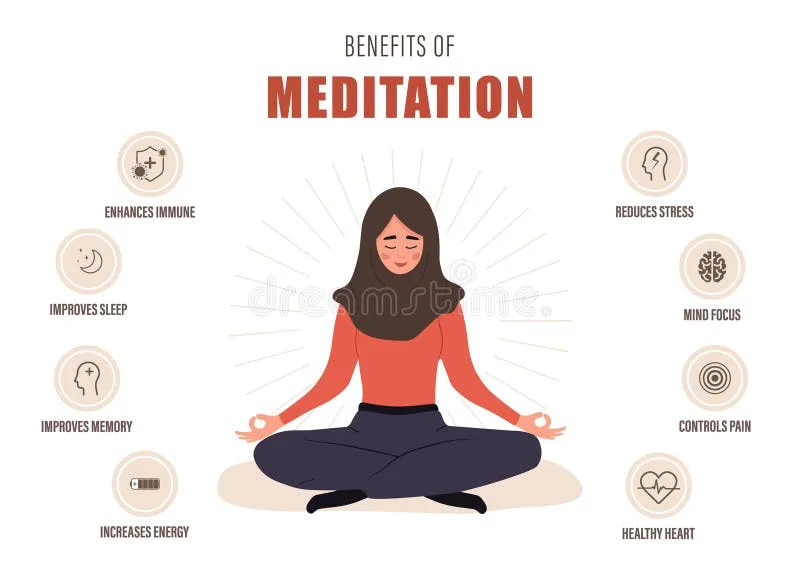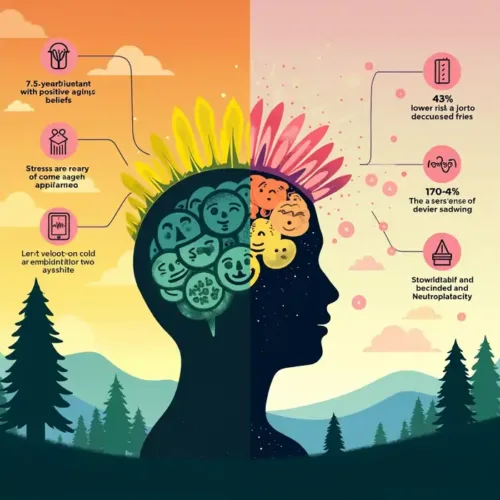How Meditation Can Help You Live Longer: The Science Explained

Here’s something surprising: meditation can reduce your risk of death by 23% and lower your chances of dying from cardiovascular disease by 30%. Scientific research reveals how meditation helps you live longer by creating measurable biological changes in your body.
The science behind meditation’s longevity benefits runs deeper than most people think. Our brain’s proteins and cellular components like telomeres play significant roles in how we age. Research shows meditation practitioners have a 30% increase in telomerase activity – an enzyme that protects chromosomes and slows down cellular aging. People who participate in meditation programs show lower inflammation levels. Their brains also develop better connectivity, especially in areas that control attention and decision-making.
The sort of thing I love about meditation is its scientifically proven age-defying effects. These range from changes in brain activity to improvements in cellular health. A regular meditation practice could extend your lifespan through several biological pathways, and we’ll explore exactly how this happens.
The Brain-Body Connection: How Meditation Affects Aging

Image Source: Frontiers
Your brain’s activity directly controls how fast your body ages. Scientists have found an amazing link between calm brain activity and living longer. This explains why people who meditate often age more slowly. Science now proves that meditation creates lasting physical changes beyond just helping you relax.
Understanding the REST protein and neural activity
REST (RE1-Silencing Transcription factor) protein plays a key role in meditation’s anti-aging benefits. This protein acts like a volume control for brain activity. Harvard researchers found that people who lived past 100 had much higher REST levels in their brain cells than those who died in their 70s or 80s [1].
Lab tests showed that animals died earlier when scientists blocked REST. They lived longer when scientists boosted their REST levels [1]. The math is simple – an overactive brain ages faster, while a calmer brain helps you live longer.
Your brain constantly produces electrical signals and transmissions. While these signals keep you alive, too much activity speeds up aging [1]. This extra activity can show up as muscle twitches or racing thoughts. That’s why meditation helps – it turns down this neural “noise” and creates real biological benefits.
How quieter brains promote cellular health
A quiet brain from meditation turns on proteins called forkhead transcription factors [1]. These proteins help you live longer through insulin/IGF signaling, just like what happens during caloric restriction. Scientists have proven that eating less helps many species live longer [1].
Meditation also reduces stress-related brain excitement. Your body changes in several good ways when brain activity becomes balanced:
- Your body makes less cortisol and other stress hormones
- Inflammation decreases throughout your body
- Your cells manage energy better (your brain uses almost one-third of your body’s energy while weighing only 1/70th of your total weight) [2]
- Genes turn on to repair and maintain cells
A quiet brain doesn’t just feel better – it makes your cells healthier. Meditation creates these changes by controlling your autonomic nervous system, which affects your heart rate and immune system [3].
Meditation’s impact on brain structure and function
Meditation can physically reshape your brain. Studies comparing long-time meditators with non-meditators show big differences in how their brains age. Scientists expected small, focused changes but found that “meditation affected regions throughout the entire brain” [4].
People who practiced mindfulness for just eight weeks showed thicker cortical areas in their hippocampus (important for memory) and emotion control regions [4]. Their amygdala – the brain’s fear center – also became smaller [4].
Brain scans show more blood flows to the frontal and parietal regions after meditation, especially in areas that control thinking [5]. Computer analysis showed that meditators’ brains looked several years younger than others their age [6].
New studies track people before and after they start meditating, confirming earlier research. One study linked changes in the precuneus brain region to lower depression scores [7].
These results look promising, but we still need more big, long-term studies with control groups to fully understand how meditation affects brain aging [8].
You can learn more about meditation’s brain benefits from Harvard Medical School (health.harvard.edu), the National Center for Complementary and Integrative Health (nccih.nih.gov), and UCLA’s Mindful Awareness Research Center (marc.ucla.edu).
Cellular Aging and Meditation’s Protective Effects

Image Source: Somatic Movement Center
Cellular Aging and Meditation’s Protective Effects
A deeper look into our cells reveals amazing evidence about meditation’s age-defying potential. The biological clock inside each cell shows us how meditation might help us live longer through changes at the molecular level.
What are telomeres and why do they matter?
Telomeres are protective nucleoprotein structures that cap our chromosomes’ ends. These structures consist of repeating DNA sequences (TTAGGG) [9]. You can think of them like plastic tips on shoelaces that stop them from fraying. These caps protect our chromosomes during cell division, but they get shorter with each division as we age [10].
Cells can’t divide properly once telomeres become too short. This leads to cellular senescence (aging), apoptosis (cell death), and genomic instability [11]. Scientists now see this telomere shortening as a vital mechanism in aging and age-related conditions [12].
Research links shorter telomeres to many age-related diseases like cardiovascular disease, diabetes, stroke, and Alzheimer’s [12]. People under chronic psychological stress tend to have faster telomere shortening. To cite an instance, caregivers of family members with Alzheimer’s showed telomeres that looked a decade older than less stressed people [12].
How meditation influences telomerase activity
Nobel Prize winner Elizabeth Blackburn found telomerase, a remarkable enzyme that can rebuild and lengthen telomeres [12]. This cellular enzyme fights telomere shortening by adding telomeric DNA to shortened telomeres, which helps cells live longer [10].
Research shows meditation positively affects telomerase activity:
- People who finished a three-month meditation retreat had 30% higher telomerase levels than those waiting to start [12]
- People who practiced Kirtan Kriya meditation for just 12 minutes daily over eight weeks had substantially higher telomerase activity than control groups [12]
- Mindfulness meditation led to a 39% increase in telomerase activity over four months [13]
The biological mechanisms work through several pathways. Meditation increases hTERT and hTR genes that make telomerase enzyme [14]. On top of that, it reduces methylation in the hTERT gene’s promoter region, which increases telomerase production [14].
The length of practice makes a difference. Studies show that more years of meditation associate with lower methylation levels in the hTERT gene promoter region, which suggests benefits build up over time [14].
The role of oxidative stress in aging
Oxidative stress plays a vital role in cellular aging. This stress happens when harmful free radicals outnumber protective antioxidants. Too many reactive oxygen species (ROS) damage telomeres directly and make them shorter faster [15].
Studies show meditation helps manage oxidative stress:
- Practitioners have much lower levels of 8-OH2dG, which shows DNA damage [1]
- Meditation boosts total antioxidant capacity (TAC), giving cells better protection [1]
- Regular practice helps keep cellular oxidative stress balanced, which protects DNA [1]
Meditation does more than reduce oxidative stress. It lowers inflammation markers like IL-6 [1] that speed up aging. It also increases helpful molecules like BDNF (brain-derived neurotrophic factor) and sirtuin-1, which help cells stay healthy and live longer [1].
Long-term meditators show an interesting pattern in their telomeres. While non-meditators’ telomeres get shorter with age as expected, long-term meditators often keep their telomere length whatever their age [11].
The National Center for Complementary and Integrative Health (nccih.nih.gov), American Association for Cancer Research (aacr.org), and Harvard Medical School’s Mind-Body Institute (hms.harvard.edu/mind-body) offer great resources to learn about meditation’s cellular benefits and how to add these practices to your daily routine.
Stress Reduction: The Key to Meditation’s Anti-Aging Benefits
Chronic stress does more than make you feel terrible—it ages you from within. Meditation can help you live longer through its stress-reducing effects. The benefits go well beyond just helping you relax.
How chronic stress accelerates aging
Your body switches to survival mode when you face stress. Modern life keeps this system running non-stop. Each year, stress-related illnesses claim about 180,000 lives [16]. Emotional stress plays a huge role in deadly conditions like cancer, heart disease, and breathing problems.
Stress cuts your life shorter through several ways at the cellular level:
- Makes telomeres (protective chromosome caps) shorter faster [10]
- Creates more oxidative stress that damages DNA [17]
- Throws off the hypothalamic-pituitary-adrenal (HPA) axis [2]
- Makes cortisol less effective at fighting inflammation [16]
Studies show that caregivers under constant stress have telomeres that look 10 years older than their less stressed peers [10]. Just thinking you’re stressed can shorten your telomeres, whatever the real situation [10].
Meditation’s effect on cortisol and stress hormones
People who meditate show real changes in their stress hormone levels. One study found that serum cortisol dropped from 381.93 nmol/L to 306.38 nmol/L after meditation [4]. Another study showed that people who meditated longer had lower morning cortisol levels [18].
Meditation works so well because it helps in many ways at once. It:
- Boosts vagal tone, which helps you rest and digest better [2]
- Calms the amygdala (your brain’s alarm system) [19]
- Helps you sleep better, which helps normalize cortisol [19]
- Keeps the HPA axis working properly to control cortisol [19]
Breaking the cycle of stress-induced inflammation
Meditation stops stress from causing inflammation that ages cells faster. When you’re stressed all the time, your body makes more inflammatory cytokines [16]. This creates low-grade inflammation that speeds up aging.
Research shows that mindfulness and meditation have a medium positive effect (g = 0.345) on cortisol levels [20]. Lower stress means less inflammation, so your body ages slower.
Scientists at Carnegie Mellon University found that mindfulness changes how brain networks connect. These changes explain why inflammation gets better [21]. The benefits aren’t just mental—meditation might help with physical conditions like asthma and arthritis too [22].
You can learn more about meditation and living longer at the National Center for Complementary and Integrative Health (nccih.nih.gov), Harvard Medical School’s Mind-Body Institute (hms.harvard.edu), or UCLA Mindful Awareness Research Center (marc.ucla.edu).
Inflammation and Immune Function Improvements
The balance between protection and inflammation in your immune system plays a significant role in how well you age. Meditation is a powerful tool that helps optimize this balance and helps you live longer through biological mechanisms that science has only recently started to understand.
The inflammation-aging connection
Systemic chronic inflammation characterizes aging, termed “inflammaging,” which goes hand in hand with cellular senescence, weakened immune function, and age-related diseases [7]. This inflammation creates a destructive cycle. Inflammatory factors promote cellular senescence, which produces more inflammation [7].
Scientists have found that immune cells lose their ability to regulate calcium signaling in their mitochondria as we age. This drives chronic inflammation [23]. The body experiences low-grade persistent inflammation that speeds up aging processes and adds substantially to conditions like Alzheimer’s disease, arthritis, cancer, heart disease, and diabetes [24].
How meditation reduces inflammatory markers
Studies show that meditation directly affects inflammatory pathways. A groundbreaking study found that meditation boosted immune function without triggering inflammatory signals [25]. This finding stands out because most immune-boosting interventions tend to increase inflammation.
Meditation decreases the activities of several inflammation-related biological markers:
- Reduces NF-κB activity, a key transcription factor controlling inflammation [26]
- Lowers C-reactive protein (CRP) levels, a major inflammatory marker [27]
- Decreases pro-inflammatory cytokines like IL-6 and TNF-α [6]
These reductions have real-life health applications. A study of ulcerative colitis patients showed that mindfulness-based interventions substantially decreased both fecal calprotectin and CRP levels. This indicates reduced intestinal inflammation [27].
Enhanced immune response through regular practice
Meditation actively strengthens immune function beyond reducing inflammation. Participants showed increased activity in 220 genes related to immune response after an eight-day meditation retreat. This included 68 genes associated with interferon signaling—vital for fighting viruses and cancer [5].
Mindfulness meditation also raises antibody titers in response to vaccines [8]. It increases CD4+ T helper cells that coordinate immune responses [28] and boosts telomerase activity that protects immune cells from aging [26].
You can learn more about meditation’s immune benefits through resources from Harvard Medical School (health.harvard.edu), the National Center for Complementary and Integrative Health (nccih.nih.gov), and the University of California’s Mindful Awareness Research Center (marc.ucla.edu). These sites provide evidence-based guidance.
Long-Term Effects of Meditation on Physical Health

Image Source: Dreamstime.com
Meditation doesn’t just calm your mind – it brings remarkable physical health benefits that help you live longer. Research shows clear improvements in key body systems that affect how you age.
Cardiovascular benefits and longevity
People who meditate regularly see substantial improvements in their heart health markers. Studies show meditation can lower both systolic and diastolic blood pressure [29]. The benefits are even better if you take blood pressure medication [29]. These findings translate to ground results – people who meditate have fewer cases of high cholesterol, hypertension, stroke, and coronary artery disease compared to those who don’t [30].
Scientists at Harvard-affiliated institutions discovered that relaxation response training helped older adults manage isolated systolic hypertension [30]. On top of that, it boosts beneficial HDL cholesterol levels [29], which provides detailed cardiovascular protection.
Improved metabolic health
Your metabolism gets better with meditation in several ways. It makes your body more sensitive to insulin [3], helps control diabetes [29], and brings down cholesterol levels [3]. Research shows that mindfulness meditation improves metabolic profiles by positively affecting blood glucose, triglycerides, and uric acid levels [31].
These benefits come from changes in neuro-humoral modulation, stress reduction, and better autonomic function [3]. Your brain’s fight-or-flight response centers become less active during meditation, which lowers stress hormone levels that can throw off metabolic balance [3].
Enhanced respiratory function
People who meditate long-term breathe better than those who don’t. Research found their resting breathing rates were slower (13.35 vs. 18.37 breaths/minute) [32]. They also showed higher peak expiratory flow rates [32] and could hold their breath longer (74 vs. 53.61 seconds) [32].
The breathing benefits get better with experience – the more you meditate, the slower your resting breathing rate becomes [32]. This efficient breathing might help you live longer through better oxygen use and autonomic balance.
Better sleep quality and its effect on aging
Sleep problems affect 20-30% of adults, especially older people [33]. Meditation offers a natural fix – studies show mindfulness meditation substantially improves sleep quality for people with insomnia [13]. One striking study found that 91% of participants cut back or stopped using sleeping pills [34].
Meditation’s sleep benefits seem to work especially well for older adults. Those who practiced mindfulness meditation reported better sleep compared to people who only received standard sleep education [35].
You can find evidence-based resources at the National Center for Complementary and Integrative Health (nccih.nih.gov), UCLA Mindful Awareness Research Center (marc.ucla.edu), or Harvard Medical School’s Mind-Body Institute.
Conclusion
Science has shown without doubt that meditation helps us live longer through several biological pathways. People who meditate have a 23% lower risk of dying early and their chances of heart disease drop by 30%. These health improvements happen because meditation has complete effects on our body – it protects telomeres, reduces inflammation, boosts immune function and helps us sleep better.
Everything in the brain-body connection shows why calmer neural states from meditation lead to better cellular health. People who meditate regularly boost their telomerase activity by 30%, which helps keep their chromosomes healthy and slows down how fast their cells age. It also lowers inflammation markers, improves heart health, and creates better metabolic profiles.
The sort of thing I love about the research is that people who meditate for years keep their telomere length the same whatever their actual age. This doesn’t happen with people who don’t meditate – their telomeres get shorter as expected with age. These findings suggest meditation could slow down how fast we age at the cellular level.
You don’t need to make meditation complicated. Even short daily sessions of 10-15 minutes are a great way to get benefits. Harvard Medical School (health.harvard.edu), the National Center for Complementary and Integrative Health (nccih.nih.gov), and UCLA’s Mindful Awareness Research Center (marc.ucla.edu) provide science-backed guidance that helps beginners get started.
FAQs
How does meditation contribute to longevity?
Meditation can potentially extend lifespan by reducing mortality risk by 23% and lowering the chances of cardiovascular disease by 30%. It protects telomeres, reduces inflammation, enhances immune function, and improves sleep quality, all of which contribute to slowing down the aging process at a cellular level.
What are the physical health benefits of long-term meditation practice?
Long-term meditation practice offers numerous physical health benefits, including improved cardiovascular health, better metabolic profiles, enhanced respiratory function, and better sleep quality. These improvements directly impact how well a person ages and can contribute to overall longevity.
Can meditation affect cellular aging?
Yes, meditation can affect cellular aging. It increases telomerase activity by 30%, which helps maintain chromosome integrity and slow cellular aging. Long-term meditators have been found to maintain their telomere length regardless of chronological age, unlike non-meditators who experience expected age-related shortening.
How does meditation impact stress and inflammation in the body?
Meditation effectively reduces stress hormone levels like cortisol and breaks the cycle of stress-induced inflammation. It also decreases pro-inflammatory markers such as C-reactive protein (CRP) and cytokines like IL-6 and TNF-α. This reduction in stress and inflammation contributes significantly to slowing down the aging process.
Is there scientific evidence supporting meditation’s effects on brain health?
Yes, scientific studies have shown that meditation can physically reshape the brain. It increases cortical thickness in areas responsible for learning, memory, and emotion regulation. Brain scans reveal increased blood flow in cognitive function areas, and studies using pattern recognition technology have found that meditators’ brains appear several years younger than those of age-matched controls.
References
[1] – https://pmc.ncbi.nlm.nih.gov/articles/PMC5278216/
[2] – https://www.sciencedirect.com/science/article/pii/S2949834123000351
[3] – https://trialsjournal.biomedcentral.com/articles/10.1186/s13063-022-06771-2
[4] – https://pubmed.ncbi.nlm.nih.gov/23724462/
[5] – https://ufhealth.org/news/2021/meditation-brings-robust-immune-system-activation-uf-health-researchers-find
[6] – https://www.sciencedirect.com/science/article/abs/pii/S0272735822000095
[7] – https://www.nature.com/articles/s41392-023-01502-8
[8] – https://pubmed.ncbi.nlm.nih.gov/12883106/
[9] – https://systematicreviewsjournal.biomedcentral.com/articles/10.1186/s13643-021-01699-1
[10] – https://pmc.ncbi.nlm.nih.gov/articles/PMC3057175/
[11] – https://www.nature.com/articles/s41598-020-61241-6
[12] – https://www.bbc.com/future/article/20140701-can-meditation-delay-aging
[13] – https://pmc.ncbi.nlm.nih.gov/articles/PMC6557693/
[14] – https://www.frontiersin.org/journals/psychology/articles/10.3389/fpsyg.2023.1222863/full
[15] – https://www.msjonline.org/index.php/ijrms/article/view/13949
[16] – https://www.psychologytoday.com/us/blog/a-subtle-impact/202406/why-a-meditation-practice-is-key-to-longevity
[17] – https://www.dermstore.com/blog/meditation-for-antiaging/?srsltid=AfmBOorz6QJMu6eV7JhWCHtHrhSeqp_lnVs3Jy9YfMT8V2LlZewzDU_u
[18] – https://pubmed.ncbi.nlm.nih.gov/22377965/
[19] – https://www.tm.org/en-us/blog/cortisol-benefits
[20] – https://www.sciencedirect.com/science/article/pii/S0306453023003931
[21] – https://www.cmu.edu/news/stories/archives/2016/february/meditation-changes-brain.html
[22] – https://www.newscientist.com/article/2137595-mindfulness-and-meditation-dampen-down-inflammation-genes/
[23] – https://newsroom.uvahealth.com/2023/07/24/inflammation-discovery-could-slow-aging-prevent-age-related-diseases/
[24] – https://www.brownhealth.org/be-well/inflammaging-what-you-should-know-about-inflammation-and-aging
[25] – https://www.pnas.org/doi/10.1073/pnas.2110455118
[26] – https://pmc.ncbi.nlm.nih.gov/articles/PMC4940234/
[27] – https://www.nature.com/articles/s41598-020-63168-4
[28] – https://immusehealth.com/news/post/how-meditation-boosts-your-immune-system
[29] – https://pmc.ncbi.nlm.nih.gov/articles/PMC10355843/
[30] – https://www.aarp.org/health/conditions-treatments/info-2021/meditation-health-benefits.html
[31] – https://pubmed.ncbi.nlm.nih.gov/29405585/
[32] – https://pubmed.ncbi.nlm.nih.gov/37554788/
[33] – https://www.frontiersin.org/journals/public-health/articles/10.3389/fpubh.2023.1242868/full
[34] – https://mindworks.org/blog/long-term-benefits-of-meditation/
[35] – https://hscnews.usc.edu/mindful-meditation-improves-sleep-in-older-adults-study-finds






